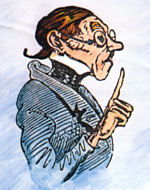|
To Add
for 2010 (back
to top)
- Wally's top-10, at: http://groups.yahoo.com/group/3rdReichStudies/message/3574
- 1. Albert Speer: His Battle with Truth by Gitta Sereny, for reasons already detailed above. Sereny got to know Speer and his wife personally, but never for an instant let it cloud her judgement or effect her scholarship. This book is a triumph.
2. Hitler and Stalin: Parallel Lives by Alan Bullock. This is a dual biography of the two dictators, but I am of the opinion that Bullocks take on Hitler is superior to that of all others who have attempted to explain and make sense of his life. Of all the books dealing with this subject that I do not actually own, it is the one I would most like to see on my shelves one day. What is odd about it is that Bullock's first book about Hitler, the full biography Hitler, A Study In Tyranny, is just terrible (of course, THAT one I have!). Written in 1957, Tyranny details the theory that Hitler was a 'non-entity' with few talents. Parallel Lives was written in 1991, and it is quite obvious that Bullock had spent the intervening years in thoughtful study, the fruits of which are contained in this very readable and insightful book. As a bonus, you also get to know Stalin in-depth. Just a great read.
3. The Third Reich: A New History by Michael Burleigh. This is an excellent general history of the Third Reich and is the book I would recommend as the first book one should read on the subject. It puts the events of the period in an easily understandable chronological perspective and makes easy learning of this material for a new reader to the subject. I wish it had been around in the late 60's when I read my first book on this subject.
4. The Devil's Disciples: Hitler's Inner Circle by Anthony Read. This excellent book relates the history of Hitler's Reich through the stories of his top cronies, Hess, Goering, Goebbels, Himmler, Speer, Bormann, Ribbentrop, as well as the lesser lights. It reads like a novel, and is so well written that even though you already know how it turns out, you still can't put it down. A wonderfully crafted book.
5. Explaining Hitler: The Search for the Origins of his Evil by Ron Rosenbaum. This fascinating book details all of the various theories about how Hitler became Hitler through interviews with their main proponents. Bullock, Trevor-Roper, Claude Lanzmann, Lois Michaels, Daniel Godlhagen, David Irving, and many others defend their various theories, and Rosenbaum succeeds in not actually Explaining Hitler, but in explaining why folks explain Hitler as they do. It is a fascinating study, and the perfect read for anyone who already has a good overall knowledge of the subject.
6. The Rise and Fall of the Third Reich by William L. Shirer. This is the first book I ever read on this subject, and even though it is a bit outdated by subsequent scholarship (particularly Burleigh's book), it is still well worth reading. Shirer met most of the players, and his insights and opinions on them and the events of the period are invaluable. I would recommend that this book be read along with Shirer's memoir, Berlin Diary, in order to appreciate the full depth of the author’s unique perspective and very perceptive opinions.
7. Der Fuehrer: Hitler's Rise to Power by Konrad Heiden. This was the first top shelf Hitler biography ever written, and was published in 1943. All subsequent biographies begin with Heiden. He was a Munich journalist during Hitler's rise, and was forced to flee Germany once he gained power. His analysis of Hitler's speechifying is first rate, though some of the sources he utilized have since been determined to be spurious. He was well-known to Hitler, who actually would delay starting a speech until Heiden was in the audience so that he could read the reporters remarks in the next days newspaper. The only real drawback to Der Fuehrer is that it was written before Hitler's death, and is thus not the whole story. But is is a very good read indeed.
8. The Meaning of Hitler and Defying Hitler: A Memoir by Sebastian Haffner. Meaning is a small volume which critically examines Hitler's policies, and is a fine example of succinct analysis. Defying Hitler is a memoir detailing Haffner's years in the Hitler Youth and his eventual emigration from Germany. It is notable for its introspective examination of the lure of Nazism, and is invaluable for anyone attempting to understand how otherwise sensible people could be seduced by Hitler. Great stuff.
9. The Nuremberg Trial by Ann Tusa and John Tusa. While there are a number of really good books about the Trial, this is the best. A very good read that succeeds in making a complex event understandable to the average reader and is valuable to the scholar as well.
10. Spandau, the Secret Diaries by Albert Speer. By far Speer's best book, and the best resource on Spandau ever written, it is both poignant and humorous. The best prison diary I have ever read.
|
 Teacher Laempel
from Wilhelm Busch's Max and Moritz (1865)
Teacher Laempel
from Wilhelm Busch's Max and Moritz (1865)